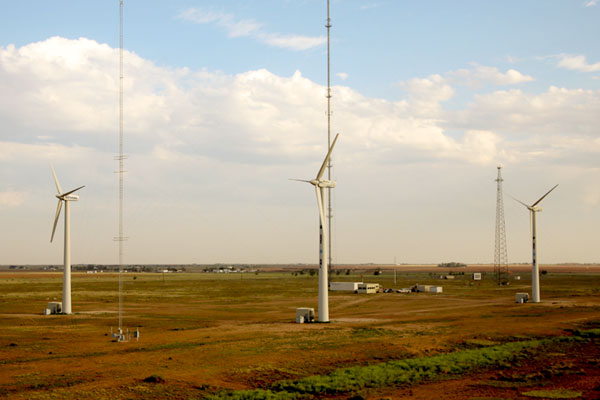
Sandia researchers Chris Kelley and David Maniaci and former Sandian Brian R. Resor have developed a wind turbine blade design that would allow for the closer placement of turbines, thanks to a faster dissipating wake.
“The blades of each turbine create a wake, slowing down the wind and stirring it,” said co-inventor Chris, who works in Sandia’s wind energy department. “The axial induction distribution, an important aerodynamic parameter in the new design, dictates how much the air slows down along the radius of the rotor when air passes through the rotor plane. The induction of this innovative blade design leads to a less stable wake that disappears faster.”
Chris said the innovation would allow for siting turbines closer together to decrease the amount of electrical lines and roads needed to connect them, which would be of particular interest to wind farm owners.
“Subsequent research could include determining exactly how the wake is made less stable, and how it could be integrated into commercial wind farms,” he said.

Next steps for the researchers include taking their idea into the field by partnering with manufacturers and owners to demonstrate the concept at a commercial wind farm. A field experiment would measure how much the new blades would reduce plant energy losses due to turbine-turbine interaction of wakes.
Chris said the idea for the patent originated during the National Rotor Testbed project, which sought to design new wind turbine blades with a focus on wake research at Sandia’s Scaled Wind Farm Technology facility in Lubbock, Texas.
“Initially we were designing a new blade set for our test site,” he said, when they realized they could change the persistence of the wake. Based on their vortex code simulations, the blade design changed the character of the wake with minimal effect on the efficiency of each turbine.
“Working in wind energy at Sandia has been rewarding,” Chris said, “because I see a direct impact of our research to reducing the cost and improving the reliability of wind energy for the electrical grid.”
The researchers were recently issued a patent for their work, “Wind Turbine Blades, Wind Turbines and Wind Farms Having Increased Power Output.”
To learn more about wind energy, visit Sandia’s Wind Energy program website or the DOE Office of Energy Efficiency & Renewable Energy Wind Energy Technologies Office.